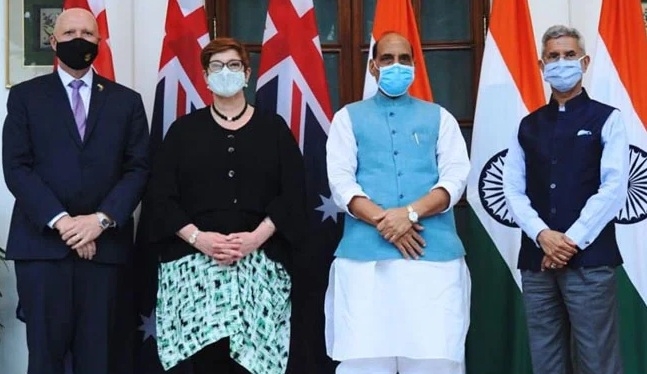Afghanistan must not be used for terror in any manner: India, Aus
| Date :12-Sep-2021 |

NEW DELHI :
India and Australia in two-plus-two dialogue vow to work towards a free, open and inclusive Indo-Pacific
INDIA and Australia on Saturday asserted that Afghanistan must not allow its soil to be used in any manner for terrorism and it should never again become a safe haven for “breeding and training” of terrorists, as the two countries held a detailed discussion on the situation in the war-torn country after its takeover by the Taliban. At the inaugural India-Australia two-plus-two dialogue, the Foreign and Defence Ministers of the two countries also vowed to work towards a free, open and inclusive Indo-Pacific, a region that has been witnessing increasing Chinese assertiveness. With the dialogue coinciding with the 20th anniversary of the 9/11 terror attacks that led to the US invasion of Afghanistan in 2001, both sides strongly called for combating terrorism without any compromise.
External Affairs Minister S Jaishankar and Defence Minister Rajath Singh held extensive in-person talks with their Australian counterparts Marise Payne and Peter Dutton. Noting that Afghanistan was a “major subject of discussion”, Jaishankar said, “we had a very detailed exchange of views and our approach is very similar in a way it is summed up by the UN Security Council Resolution 2593 which emphasises most of all that Afghanistan must not allow its soil to be used in any manner by anybody for terrorism.” Addressing a joint media briefing along with other Ministers, the External Affairs Minister said there were also concerns relating to the composition of the interim Taliban cabinet as well as about the treatment of women and minorities. Jaishankar said both sides agreed that the international community must be united in its approach, guided by UNSC Resolution 2593. On her part, Payne said Australia shares a very strong interest in ensuring that Afghanistan never again becomes a “safe haven for breeding or training of terrorists”, noting that it is an abiding concern of the international community.
During the talks, the two sides also deliberated on the situation in the Indo-Pacific, South China Sea, ways to further deepen bilateral defence and trade cooperation and to effectively deal with the challenges of coronavirus pandemic. Jaishankar said the ‘two-plus-two’ dialogue reflected the comfort that India and Australia have attained in the bilateral relationship, especially in strategic and security spheres, based on the growing convergence based on a shared commitment for a free, open, prosperous and rules-based Indo-Pacific region. “The peaceful development of the Indo-Pacific region has been a focus of our relationship. Our two countries believe that it should be shaped in a participative and collaborative manner,” he said. India and Australia dismissed criticism that Quad was a sort of an ‘Asian NATO’ with Jaishankar asserting that it is important not to “misrepresent” the reality.
Asked about Quad being referred to as an ‘Asian NATO’, Jaishankar said,”we call ourselves Quad and Quad is a platform where four countries have come to cooperate for their benefit and for the benefit of the world.” “I think a term like NATO is very much a cold war term, looking back. I think Quad looks in the future, it reflects globalisation, it reflects the compulsions of countries to work together,” he said. Jaishankar also pointed out that Quad was currently focussed on issues such as vaccines, supply chains, education and connectivity. Aus Foreign, Defence Ministers meet Modi: THE shared commitment of India and Australia to a rules-based international order and an open and inclusive Indo-Pacific was discussed when the Foreign and Defence Ministers of Australia met Prime Minister Narendra Modi on Saturday. Australian Foreign Minister Marise Payne said the shared commitment was discussed at the meeting. “Australia & India are longstanding partners. In our meeting with Flag of India Prime Minister @narendramodi, we discussed our nations' shared commitment to a rules-based international order, an open, inclusive & resilient #IndoPacific & strengthening the Australia-India economic relationship,” Payne tweeted.